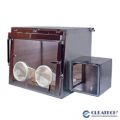Crucial Factors to consider while purchasing stainless steel workbenches

As a dedicated laboratory equipment provider, Global Lab Supply has the experience and expertise to provide stainless steel workbenches. Steel workbenches are perfect for any industrial setting where harsh chemicals and other corrosive liquids are used. They will not rust nor be affected by most solvents or acids. Steel workbenches can be arranged in any number of configurations allowing for increased usage. In many cases, the stainless steel surface is also specially textured, making it resistant to scratching or pitting from chemicals, acids, salt water etc.
Type of surface:
The type of surface you should choose depends entirely on the chemical you use. For example, stainless steel tables are your best bet if your workbench is to be used for digital scales and other precision measuring instruments. However, if your workbench mainly involves de-ionizing salts, cleaning agents and other corrosive chemicals, then a non-corrosive work surface is critical to maintaining a clean and efficient laboratory.
1. Aluminium:
Most stainless steel workbenches are made from aluminium, which means they can easily rust if exposed to solid acidic chemicals such as those found in bleach or vinegar. In addition, it can lead to discoloration in metal particles, oxidation or even corrosion. Corrosion of aluminium is best prevented by periodically plating your work surface with a non-corrosive varnish. Varnish should also be reapplied whenever you notice any signs of corrosion.
People can also prevent corrosion by purchasing stainless steel sheets with no exposed metal inside the coat. It will protect them from the effects of acidic solutions and chemicals, as well as further protection against scratching and pitting.
2. Vinyl:
Stainless steel surfaces can also be textured with a vinyl finish to further prevent corrosion, especially in conditions where moderate to high levels of corrosive chemicals are used. In addition, the vinyl finish is resistant to pitting and scratching, making it an ideal surface for industrial use. Stainless steel workbenches also come with a non-porous surface. It allows it to be wiped clean much faster than wood, making it ideal for the most demanding of environments.
In fact, due to its many advantages, stainless steel has been a popular industrial material for several decades.
Mobility and Cost-effective:
Stainless steel surfaces can also be mobile, which means that they can be easily rolled from one part of the laboratory to another and are easy to move even when loaded with equipment.
In addition, Stainless Steel Workbenches are usually more comprehensive than most traditional workstations, making them a bit more comfortable for shorter individuals.
Stainless steel surfaces are generally more expensive than coated wooden tables or metal surfaces. However, they have numerous advantages over traditional workstations, which justify their price tag. For example, stainless steel workstations last longer, require less maintenance, require less space, and cause less hassle compared to wood or metal tables.
Adjustability:
Stainless steel workbenches are also easily adjustable depending on the height of your working surface, making them an excellent choice for short or tall individuals. Stainless steel surfaces are also resistant to rusting, staining and corrosion and hence have a much longer lifespan than other materials such as aluminium. This increased lifetime is an added benefit that makes up for the extra cost. In addition to the above, Stainless Steel Workbenches are also perfect for digital weighing scales and other laboratory equipment, making them an excellent choice for any laboratory environment.
Pocket Friendly:
A Global Lab Supply Stainless steel workbenches are also cost-effective in comparison to traditional wood workstations. Therefore, they are the ideal choice for any laboratory environment where space is at a premium. Stainless steel surfaces are also elementary to look after, making them an excellent choice for the more demanding laboratory environments. Stainless steel surfaces also offer immense storage possibilities. They can be stacked in any number of ways and can easily be stored away when not in use. These workbenches are thus a good choice for industrial areas where space is of the essence.
Material Composition:
In addition to its many other advantages, stainless steel surfaces are also non-toxic and highly durable, making them an excellent choice for industrial environments where chemicals and acids are used regularly. Standing up to the rigours of industrial use, stainless steel surfaces can be stacked and kept in storage without any damage occurring by rusting or corrosion during the following period. With a width of 36 inches, these workbenches are perfect for long work surfaces. However, it is essential to maintain the height of your stainless steel surface at an optimum level; otherwise, your table may start taking on wood-like properties.
Conclusion:
Stainless steel workbenches are a perfect choice for any laboratory setting. They come in various designs, and their sizes range from 36 to 72 inches in width and can be made in various materials. They are non-toxic, durable, and highly affordable. In addition to its many other benefits, stainless steel surfaces can also be adjusted by users for the height of your working surface. Most importantly, these workbenches offer immense storage capabilities and thus provide additional space for your other items, which users can usually store under your workbench tops.
Original Sources: https://www.fuzia.com/article_detail/683473/crucial-factors-to-consider-while-purchasing-stainless-ste
Other articles and publications:
Articles and publications of other companies:
- +1 (714) 754-6660
- 2106 N Glassell St, Orange, CA, 92865, USA
- www.globallabsupply.com/Chairs-Stools-s/1825.htm





